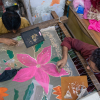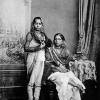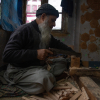Three women were walking on the side of the railway line.
Where was this?
Near which railway line?
What was their religion?
What were their castes?
Details are unnecessary.
Three women.
One was a beautiful young woman, her eyes were bright; she had a spring in her step. Her breasts were youthful.
One was a mother; the child in her lap was a pink piece of flesh, seven days old. She looked at her child with loving eyes. Then she hugged the baby to her heart as if she was saving him from imminent danger.
One was a beggar. Once upon a time, her sari may have been white; now it was dust and sweat. Its dirt had not been washed for ages. Once upon a time her sari might have measured five metres but now, when strip after strip had been torn off, it was hardly three metres. That was not enough to cover her body. Her hair was caked with dirt and sharp stones had bloodied her feet.
Three women were walking along the railway line.
Three women.
Far away the two gleaming rail tracks had converged into one long line. Where the two parallel rows met, they seemed to disappear in the sky. A small black dot was visible there. The breeze carried the faintest sound of the whistle of an oncoming train. When she heard the sound of the whistle, the beggar became alert. But instead of despair there appeared a shade of a dreadful resolve on her face. For a second her eyes became glued on the spot where the small dot was visible. Then she quickly jumped and started walking between the two parallel tracks. The young woman and the mother when they saw the dreadful look on herface, became distraught with worry. The moment the beggar jumped between the lines, they both jumped right behind her.
‘What do you want to do?’ The mother asked the beggar. But the tone of her voice revealed the uselessness of this question. ‘You know very well,’ the beggar answered carelessly. She kept her glance fixed on the horizon where the tiny dot was no longer a tiny dot. ‘Have you gone mad?’ The young woman spoke in a tone that revealedher sudden realization of the gravity of the situation.
The beggar was taking long strides so the two women behind her were hardly able to keep up.
‘Are you mad?’
‘Me?’
The beggar’s loudlaugh terrified the young woman and the mother. ‘Am I mad or are you mad that until today you are hoping for justice in this game called life? Why should we stay alive? For me death is a thousand times preferred.’
The young woman was not going to give up this easily, ‘But think of my youth? In a woman’s life, there is only this onetime! And if one doesn’t enjoy life then...’
‘Youth!’ The beggar disdainfully cut her short.
‘Youth! This very youth which is worth four annas. This very youth, which a brute stole from you with sweet-talk and left you to flounder through life! This very youth, which you are forced to sell everyday in the market! Sell to every policeman, every railway man, every drunk and anyone who pressed four annas in your hand! I spit on such youth.’
Now it was the turn of the mother. She looked at her child as if gaining strength from him in order to reason with the beggar. ‘But my little child, what has he done to deserve this? Why should I hand him the death sentence? For his sake, I must stay alive. No matter how much I may have to suffer.’ Then she desperately held the child to her bosom saying, ‘My little baby! My child.’
‘My child?’
The disdain and disgust in the beggar’s voicemade the mother speechless.
‘This little piece of flesh that you clutch to your bosom wherever you go is the living example of the injustice and the violence of society; the root cause of your destruction. What will he do when he grows up? Will he become a laatsahab or lakhpati? In this country there is no lack of beggars. Why didn’t you throw him at his father’s doorstep? He would have brought him up, the coward, the kamina (scoundrel), to atone for his sins.’
The mother spoke fast, ‘No, no! Don’t say anything to ‘him’.’
In the word ‘him,’ there was a lingering tone of affection. While she spoke the word, her eyes were the eyes of a new bride. ‘Don’t say anything about him. He was helpless before his father and mother.’
The beggar fumed with anger. The small black dot had now become larger and every moment was coming closer. Its sound was getting louder.
‘Was he helpless due to his parents or due to the property? And where did your parents’ love vanish? Did it vanish the moment they threw you out of the house on that dark winter night because they feared social censure if your condition was revealed?’ Saying this the beggar ran towards the oncoming train; the young woman and the mother ran behind to stop her mad race.
Like a black ogre the rail engine was hurtling at the speed of 50 miles per hour. A dreadful whistle sounded but the beggar did not hesitate. The wheels of the engine were rushing towards her.
In one of the compartments, two obese businessmen were negotiating a deal of lakhs and lakhs of rupees. Before them were placed liquor bottles from which they were downing glass after glass. They were drunk and oblivious of the world. In the third class compartment, like animals, the poor farmers and labourers were stuffed. A blind beggar, a tambura (wind instrument) in his hands, was serenading them with bhajans (religious songs).
In a drunken state and oblivious of his own pain, a mad man was sitting by the window muttering ‘Ram Ram Sat! To hell with you.’ The terrifying whistle of the engine sounded a few times; in its echo was the lurking danger.
‘Stop, stop, stop,’ the young woman and the mother made their last attempt . They were begging the beggar.
‘I have made my decision. If you love life, you get the hell out...’ She said jerking them off.
‘But if you die how can we remain alive?’ They both replied. The whistle sounded again this time very, very close.
The young woman was breathless. But she lunged forward and caught the edge of the beggar’s sari and tried to yank her off the fatal path. The mother clutched her child with one hand and with the other tried to throw her off the railway line.
Their efforts were useless. The engine had come so close that the beggar could see the distraught face of the driver. Using every bit of her strength she freed herself from the young woman and the mother.
Suddenly, the train screeched to a stop and the businessmen’s drunken stupor vanished. Liquor bottles and glasses dashed to the floor. In the third class compartment, the tambura fell from the hands of the blind beggar and he forgot his bhajan. The travellers got down from their compartment and started walking towards the engine.
‘What happened? What happened?
‘Someone has been run over by the train.’ ‘Oh this seems to be a beggar!’
‘But beautiful and young.’ ‘And the poor woman’s child is also dead.’ ‘What happened? What happened? Who died?’
‘A woman was run over by the train.’
The mad man who thus far was standing by quietly suddenly shouted, ‘Oh you maniacs, this is not one woman. These were three women.’ And then he began to mutter, ‘Ram Ram Sat. To hell… Damn you all!’
(Translated by Syeda Saiyidain Hameed, ‘Teen Aurtein’ is extracted from Naye Zaaviye (New Angles): An Anthology of Poems and Short Stories, ed. Krishan Chander, Lahore: 1941)












